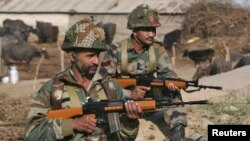Prominent Indian editors and journalists have criticized the government for ordering a leading television news channel to go off the air for one day as a penalty for its coverage of a terror attack earlier this year.
The Editors Guild of India called the ban – the first on a media broadcaster for reporting terrorist attacks – "harsh censorship" reminiscent of emergency rule imposed in 1975, when fundamental rights were suspended in the world’s largest democracy.
An Information and Broadcasting Ministry panel said the NDTV Hindi channel allegedly revealed "strategically sensitive" information that could have been picked up by terrorist handlers and potentially harmed national security during operations to take out militants who attacked the Pathankot air base in northern India in January. Seven Indian soldiers were killed in the attack.
The panel said the TV channel put out information on weapons and on the location of fighter planes and tanks at the air base.
Denying the charges, NDTV said in a statement that “it is shocking that it has been singled out. Every channel and newspaper had similar coverage. In fact, NDTV’s coverage was particularly balanced.” The statement added that "after the dark days of the emergency when the press was fettered, it is extraordinary that NDTV is being proceeded against in this manner."
The emergency rule it referred to was a 21-month period from 1975 to 1977, when India’s media was subjected to strict censorship.
Punishment protested
Calling the government’s order a direct violation of media freedom, Editors Guild of India President Raj Chengappa told VOA "this is very, very harsh punishment meted out." The government could have taken legal recourse, he said, adding, "We think the ban is an extreme step."
The Editors Guild has called on the government to withdraw the order.
The government has given itself the right to impose punishment on media, Chengappa said. "Today it could be a national security issue. Tomorrow the government could turn around and say, we did not particularly like the coverage of another program. What then?"
A prominent news anchor with the rival India Today media group, Rajdeep Sardesai, tweeted, "One of India's most sober and responsible channels, NDTV India, to be banned for a day by I and B Ministry. NDTV today, who tomorrow?"
NDTV is reputed to be one of India's most balanced channels.
Guidelines for coverage of terror attacks were communicated to the stations last year after reporting of the devastating 2008 terror attacks in Mumbai came under scrutiny. Fears were voiced that information put out by some broadcasters on the whereabouts of security forces and civilians could have helped the terrorists, who were holding hostages inside a five-star hotel. The attack claimed 170 lives.
That criticism prompted guidelines directing TV channels to avoid live broadcasts of security operations and to restrict giving out details, such as the number of hostages during an ongoing attack.
Last year, the government took Qatar-based international news channel al-Jazeera English off the air for five days for showing maps with “parts of Indian territory inside Pakistan.”




